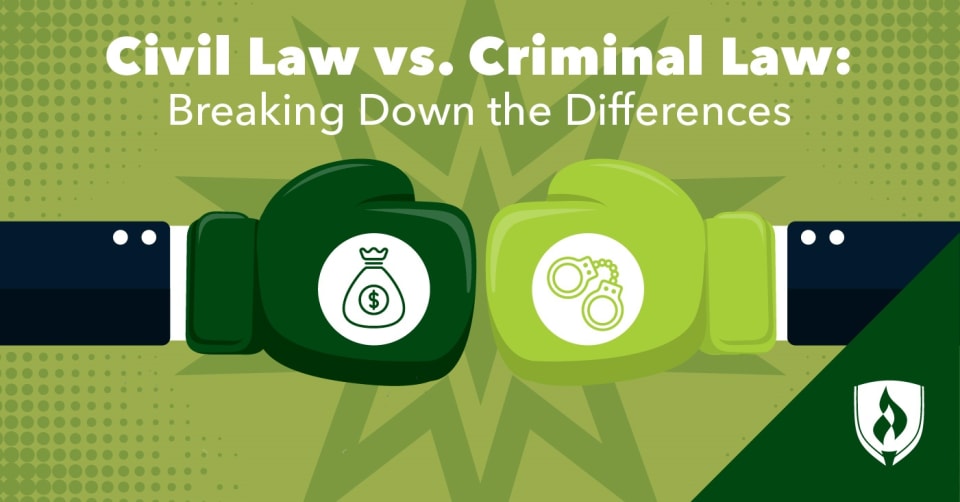
From John Grisham’s best-selling novels and the Law & Order® universe on TV to the more recent trend of true crime shows and podcasts, there is a fascination with how the media portrays the American legal system. Audiences are drawn to the drama, suspense and justice of the courtroom. We love to watch and listen as lawyers do what they do best: defend the innocent and prosecute the guilty.
But how much do you really know about how the law actually works? Are you aware of the nuances of civil law versus criminal law? You’ve heard the terms used, but do you know how they differ?
We enlisted some legal experts to help break it down. Keep reading to explore the similarities and differences between civil law and criminal law.
Civil law vs. criminal law: The basics
If you’re at all curious about the topic, you’ve likely already employed the tried-and-true method of checking the Merriam-Webster dictionary.1 Here’s what they have to offer:
“Criminal law” definition: The law of crimes and their punishments.
“Civil law” definition: The law of civil or private rights.
While these statements are accurate, they’re not quite the expansive definitions you’re looking for. You likely have additional follow-up questions, so let’s dig into some of the basic differentiators between civil and criminal law.
While both deal with resolving a wrong committed by one party to another, there are several primary differences between criminal law and civil law, including:
- The conduct at issue
- Punishments
- Burden of proof
- Statutes of limitations
- Who initiates a case
- Appeals process
While this list is not exhaustive, it does cover many of the key divergence points between civil and criminal law.
With all of that said—what is civil law? To put it simply, civil law deals with resolving disputes between one entity and another. The guidelines for these disputes are outlined in official documents like a state’s business and professions code, the health and safety code, and other governmental rules and regulations. The cause of action in these cases can be initiated by private as well as public parties.
Criminal law, on the other hand, deals with an individual’s offenses against the state or federal government. It may sound literal—like someone physically assaulting a government official—but an offense against the state essentially means breaking a criminal law established by government.
“In simple terms, the difference between civil and criminal laws lies in the codes and statutes used in the practice of each,” says employment lawyer Robert Odell. He goes on to explain that criminal law, which deals with offenses against the government like murder, theft and drunk driving, is guided by the penal code.
Civil law vs. criminal law: Conduct at issue
Since the rules or laws being violated vary between civil and criminal law, the specific conduct at issue also differs.
“The conduct at issue in criminal cases is generally more serious than civil cases and frequently involves intent,” says Peter Anderson, a Washington, D.C. civil litigation attorney. “Civil cases frequently involve negligent conduct.”
For example, a person intentionally killing another person is a criminal offense. A civil offense, on the other hand, often looks more like someone failing to follow city code—not clearing snow from a sidewalk that results in someone slipping and getting hurt, for example. Failing to shovel, in most cases, doesn’t live up to the standard of a criminal act, but it is against the rules and gives the person harmed an avenue for seeking justice for damages.
Civil and criminal law examples
While the following examples are by no means comprehensive, they should give you a better idea of the subjects and types of cases you may find in either branch of law.
Law Examples | |
Civil law examples | Criminal law examples |
Custody disputes | Homicide |
Bankruptcy | Conspiracy |
Defamation | Obstruction of justice |
Breach of contract | Assault |
Property damage | Possession of a controlled substance |
Civil law vs. criminal law: Punishment
Another important distinction between civil and criminal law is the type of penalty paid for being found guilty. In a criminal case, if the individual charged with a crime loses the case, they’re likely facing incarceration or some type of probation. For civil cases, the resolution to a case doesn’t result in the “losing” party going to jail. Often, the judgment results in a financial penalty and/or an order to change behavior.
Civil suits are also often settled outside of the courtroom. This typically includes a substantial payment to the accuser in exchange for the suit being dropped and the defendant admitting to limited or no wrongdoing.
Civil law vs. criminal law: Burden of proof
Another significant distinction between civil and criminal cases is what it takes for a party to win a case. In either trial, the accuser must meet a burden of proof—essentially an obligation to prove or back up the claims being made. Criminal cases, and the serious penalties that can accompany them, require a higher bar to be met than civil cases. In criminal law, the standard is that the accused are guilty of committing a crime “beyond a reasonable doubt.”
For civil cases, the burden of proof is lower—usually based on the “preponderance of evidence” or “clear and convincing” standards. These different standards can seem a bit frustrating to those who aren’t familiar with them. You’ve likely heard of criminal cases where the evidence makes the accused seem like they’re probably guilty, but they were not convicted. In these cases, criminal defense attorneys worked to poke holes in the credibility of the evidence and witnesses presented to create reasonable doubt among jurors.
Civil law vs. criminal law: Mindset
How an attorney approaches a case can also vary greatly in the two different fields, according to Braden Perry, attorney at Kennyhertz Perry Law.
“The burden of proof, rules of evidence, litigation strategy and overall philosophy of a case is different between the two,” Perry explains.
He notes one of the biggest differences is the approach to negotiating a deal. Civil suits have much more flexibility in how they are resolved. He explains that negotiations in criminal law require you to think beyond the scope of a typical civil case; factors like potential incarceration and the rights of an individual after a plea agreement can make things complicated. Additionally, plea agreements in criminal cases aren’t just between the two parties involved, since judges can reject agreements for a variety of reasons.
“In criminal law, you are the mercy of the court, even in a plea deal, as opposed to a typical civil settlement that is ordinarily outside judicial review,” Perry says.
In civil cases, there’s much more latitude to find an acceptable solution for the parties involved—and that’s reflected in the number of cases that are actually resolved within court. A huge percentage of civil cases end in a settlement without ever making it to trial.
Civil law vs. criminal law: Statute of limitations
There can also be significant differences in the amount of time in which a prosecutor or plaintiff has after an incident to press charges or bring a claim against a defendant. These rules are intended to protect defendants from unreasonable demands. Think of it this way—if someone accused you of a crime that occurred 20 years ago, would you be able to provide evidence to the contrary after that much time has passed?
Each state has its own set of guidelines for these, but it is worth noting that many serious crimes like murder, major theft, kidnapping or sexual assault may not have a statute of limitations.
Civil law vs. criminal law: Who files a case?
Another distinction between civil law and criminal law lies in who can initiate a case. Civil law cases can be initiated by any party. As you might imagine, this does have the potential to be abused—for example, the practice of filing (often unwinnable) strategic lawsuits against public participation (SLAPP) in an effort to potentially overwhelm the opposing party with legal expenses. While this is a great example of how the broader standard for who can file suit in a civil case can have drawbacks, it should be noted that many states have adopted laws to help curb this practice.
For criminal law, only the government can initiate a case. This is typically the responsibility of local, state and federal prosecutors who work in coordination with law enforcement agencies. The decision to charge an individual with a crime isn’t always cut-and-dry, either. Prosecutors must weigh the evidence and circumstances surrounding a case and use their discretion to determine which charges are most appropriate and most likely to lead to a conviction.
Ultimately, prosecutors work for the public and should ideally be strong stewards of resources—so devoting a lot of time and energy toward pursuing harder-to-prove charges may not always be the best course of action. It is also fairly common for prosecutors to decline to pursue legal action for certain types of low-level infractions.
Civil law vs. criminal law: Appealing rulings
One of the foundational principles of the United States’ justice system is the ability to appeal a court ruling. Both criminal law and civil law cases can be appealed all the up to either the state Supreme Court or U.S. Supreme Court (the final arbiter depends on the circumstances of the case).
There is a significant difference in the appeals process for civil and criminal cases. In civil cases, either party can appeal a ruling. With criminal cases, only the accused can appeal the decision—and for good reason. The “Double Jeopardy” Clause of the Fifth Amendment protects individuals from the threat of a retrial after an acquittal. Without it, the government could in theory put an individual through a continuous series of trials for the same crime until they receive a favorable verdict.
Can civil law and criminal law apply in the same case?
In some instances, both a civil suit and a criminal case can stem from the same incident. Likely the most prominent example of this scenario is the O.J. Simpson case—his criminal charges were dismissed, but the family of the victim was able to successfully sue him in civil court.
This may seem like an uneven application of justice but remember the standards for burden of proof. A civil case doesn’t need to be as airtight as a criminal case to win a decision. So in this scenario, the jury in the criminal case thought there was at least some doubt about Simpson’s guilt, but in the civil case, a jury felt it met the standard of a preponderance of evidence.
Dive deep into law
As you can see, when comparing civil law versus criminal law, there are several important distinctions that impact a legal team’s approach. If you love learning about the intricacies of the legal system, you might want to consider playing a role in the courtroom yourself.
There’s a wide variety of legal professionals you can find in a courthouse setting—whether it’s paralegals, attorneys or the judges presiding over the daily docket.
Related Articles:
1Merriam-Webster’s collegiate dictionary. Springfield, MA: Merriam-Webster Incorporated.
Law & Order is a registered trademark of NBC Universal Media, LLC.
Editor’s Note: This article was originally published in 2017. It has since been updated.




